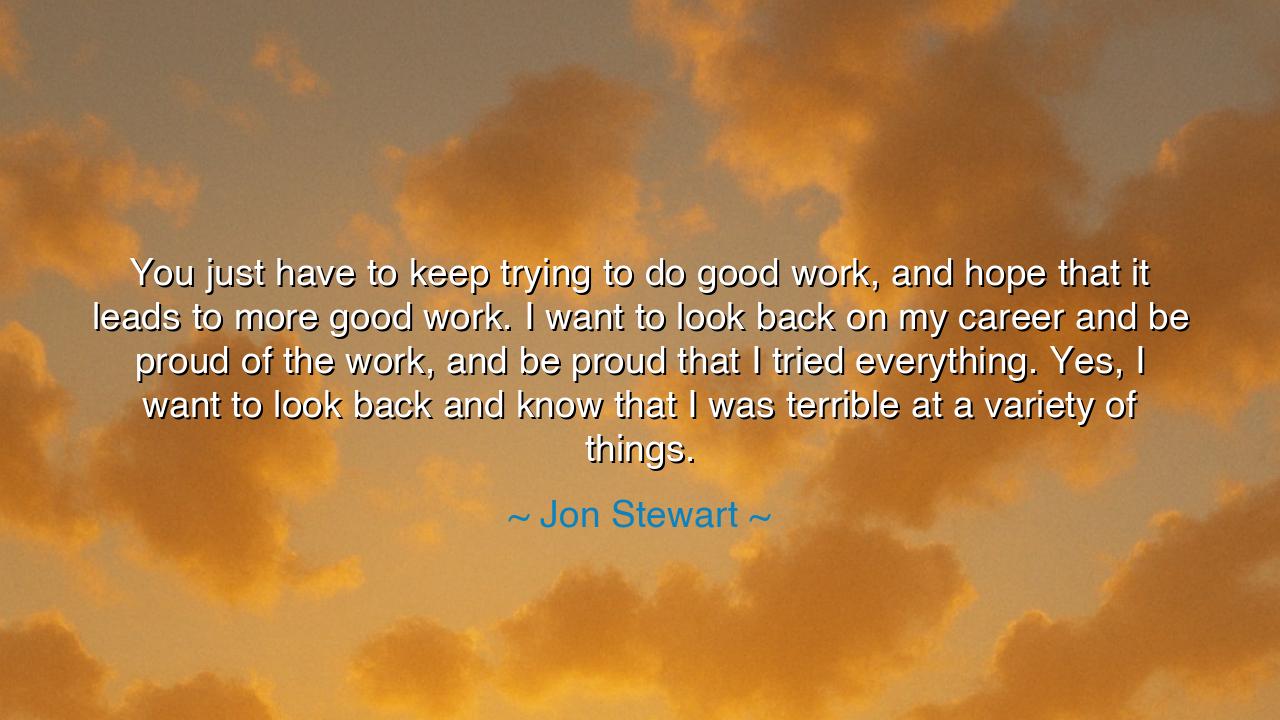
You just have to keep trying to do good work, and hope that it
You just have to keep trying to do good work, and hope that it leads to more good work. I want to look back on my career and be proud of the work, and be proud that I tried everything. Yes, I want to look back and know that I was terrible at a variety of things.






“You just have to keep trying to do good work, and hope that it leads to more good work. I want to look back on my career and be proud of the work, and be proud that I tried everything. Yes, I want to look back and know that I was terrible at a variety of things.” Thus spoke Jon Stewart, the jester-philosopher of our age—one who wrapped truth in laughter and gave wisdom the mask of wit. Yet behind the humor of these words lies a teaching as timeless as the dawn: that the measure of a life is not in perfection, but in persistence, not in triumph alone, but in the courage to try. Stewart reminds us that greatness is not forged by unbroken success, but by the willingness to fail gloriously in the pursuit of what is good.
To the ancients, this lesson was sacred. The philosopher Seneca wrote that “the road to wisdom is steep,” and Aristotle declared that excellence is not an act, but a habit—born from labor, failure, and renewal. Stewart’s words echo this eternal truth: that good work begets good work, not through fame or fortune, but through the slow, steady rhythm of honest effort. He speaks as one who has known both acclaim and obscurity, one who understands that the artist’s task is not to chase applause but to build a body of work that stands as a testament to sincerity, curiosity, and courage. For the world changes, but the spirit that strives to create meaning remains forever noble.
In this saying, Stewart also exalts the virtue of humility. To wish to be “terrible at a variety of things” is not to embrace mediocrity—it is to reject fear. It is to say, “I will not be paralyzed by the dread of failure; I will leap, I will stumble, and still I will rise.” The one who never fails has never dared enough. The inventor Thomas Edison, when asked about his many failed attempts at creating the light bulb, replied, “I have not failed—I’ve just found ten thousand ways that won’t work.” He, too, was “terrible at a variety of things,” and yet, because he dared to persist, he illuminated the world. So too does Stewart’s quote invite us to see failure not as shame, but as proof of courage—the mark of those who live fully rather than safely.
The meaning of this wisdom reaches beyond art or career; it is a philosophy of living. To “keep trying to do good work” is to walk the path of integrity—to make of every action, no matter how small, a reflection of one’s truest self. It means to plant seeds without demanding harvests, to create with faith that goodness multiplies even when unseen. The hope that one’s labor leads to “more good work” is not a wish for reward, but a hope that the act of doing itself becomes the reward—that every endeavor, whether success or failure, refines the spirit and strengthens the will.
There is also in Stewart’s words a quiet defiance of the illusion of perfection that plagues the modern soul. We are taught to polish our image, to fear imperfection, to chase flawless success. Yet perfection is sterile; it breathes no life. The ancient Japanese spoke of wabi-sabi, the beauty of the imperfect, the incomplete, the transient. They understood that the cracked bowl, mended with gold, holds more soul than one unbroken. So too, Stewart urges us to find dignity in our own cracks—to be proud not only of what we achieved, but of what we dared to attempt, even if the result was clumsy or small.
History, too, bears witness to this truth. Consider Vincent van Gogh, who died poor, believing himself a failure, his canvases unsold. Yet his devotion to “good work” outlived despair; his faith in the act of painting, not in its reward, became his immortality. His art now touches hearts across centuries—not because he succeeded, but because he kept trying. So it is with all who live sincerely: their legacy is not measured in wealth or recognition, but in the quiet integrity of their effort.
The lesson, then, is this: live bravely, create earnestly, and do not fear imperfection. Let your measure of success be not how high you rise, but how fully you gave yourself to the climb. Try, fail, learn, and try again. Fill your life with experiments of the heart—with kindness attempted, art created, truth spoken, even when imperfectly. At life’s end, may you look back not on the trophies you won, but on the worlds you dared to build and the goodness you strove to bring forth.
And if, as Jon Stewart says, you can look back and laugh—knowing that you were “terrible at a variety of things,” yet brave enough to try them all—then you will have lived wisely. For in such a life lies true mastery: not mastery over craft, but mastery over fear. Such is the path of the seeker, the creator, the soul that never stops growing. Keep doing good work, my friend, and let the work itself become your joy—for the world belongs not to the perfect, but to the persistent.






AAdministratorAdministrator
Welcome, honored guests. Please leave a comment, we will respond soon